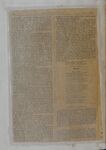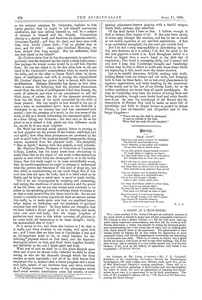
< The History of the Movement Known As Modern Spiritualism and the Facts and Theories Connected With it (continued from page 8-187) >
so the eminent scientist, Dr. Carpenter, explains to him (quite gently) that he ought to call himself unconscious cerebration, and once calling himself so, will be a subject of interest to himself and his friends. Unconscious shoving is a shorter word, and describes his character exactly, interposes Tyndall; call him the devil, and have done with him, cries kindly Canon Ryle; “let us abolish him at once, and for ever.” Amen, says Cardinal Manning; we have dodged him long enough. But his defenders, what can they plead on his behalf?
Mr. Crookes shows how he has demonstrated, by careful experiment, that the despised one has verily a claim to his name; that perhaps the wisest course would be to call him Psychic force. No one can object to it, for this allies him on the one hand to Dr. Carpenter’s nomenclature when he merely kicks the table, and on the other to Canon Ryle’s when he shows signs of intelligence and will, so among the unprejudiced Mr. Crookes’ theory has grown daily in favour, with various modifications. Madame Blavatsky has shown us how often there is reason for believing that the physical phenomena result from the action of intelligences lower than human, the souls of animals, and what we are accustomed to call the blind forces of nature, the life of the elements sometimes from the life force of the circle controlled by the wills of those present. She has taught us how absurd is our use of such a term as materialised spirit; how, as the God-life is developed in us, we become less and less associated with matter; how the presence of a spirit, in the true sense of the word, is felt as a breath influencing our innermost spirit, not as a force lifting our furniture; but that only so far as the ghost in us is indeed a holy ghost can this influence reach us, can we be in any sense inspired.
Dr. Wyld has devoted much patient labour in proving to us how gigantic are the powers of the human embodied soul and spirit; how often these phenomena are produced by the soul or spirit body of the medium himself temporarily, during trance, separated from his physical body. His pamphlet, “Man as Spirit,” dealing with this subject, is very valuable.
Mr. Stainton-Moses, Professor of Literature at University College, London, has for many years been attempting to make clear that as the object of our study is that mysterious psyche or soul which links the divine part in us to the bodily frame, that this study ought to be most scientifically exact, that by careful experiment we ought to attempt to understand what the powers and functions of this soul or ψυχη are, but that while so experimenting we can never forget that if this soul does thus act upon the body, that it is itself acted on by h Spirit, and by being so acted upon is saved or made healthy.
For if we are investigators by weighing and measuring, and testing the conditions of atomic structure and the power of the life force, are we not also bound most solemnly to be aiders in the spreading glorious knowledge which witnesses to us that to exist is not to live, if to decay is not to die. Are we not bound to consider in every experiment what an earnest matter this really is, to make quite sure that our psychical knowledge makes us furtherers and not hinderers of spiritual progress here and there? To keep before our thoughts that we have indeed a divine spark in us to develop, and make rules over soul and body, that the happy kingdom of perfection may come to this whole universe, all glorious in I its outer body, all harmonious in its inner thought; verily, the materialised idea of God?
So it seems to me; and those who believe as I do, that it is really soul force working in our circles, will agree with me; and I trust that we have here in Cambridge a real and an all-important work to do, to stand between the disbelieving* physical school on that hand, and the dogmatic theological school on that, and bind them together humbly and faithfully as the soul binds spirit and body.
What sort of soul we shall be to this place depends upon what sort of soul we choose to be—whether we shall be those among us who are the channels through which the force reaches us more especially; but all of us, God knows how important this is, seekers after a better progress and a more true light, raisers of our brethren here and there, wielders of a “sledge hammer” by means of the phenomena which shall crush modern materialism some day utterly, or mere passing phenomena-hunters playing with a fearful weapon which shall, perhaps, slay ourselves.
Of the devil theory I have no fear. I believe enough in God to believe Him creator of all. If this soul force exists, it exists only through His creation, and has its use as much as our bodily appetites or our spiritual aspirations. A fact is an everlasting stronghold, for you can’t get outside God.
But I do feel a deep responsibility in introducing up here this new doctrine, as it is called; I do feel for good or for evil how gigantic a truth it is. Lord Brougham called it a cloud no bigger than a man’s hand in the dark sky of scepticism; that cloud is increasing daily, and I cannot tell you how I long that Cambridge thought and Cambridge culture may be able to direct to noble uses those drops which are beginning to fall, much more the future showers.
Let us be careful observers, faithful, seeking only truth, holding firmly both our science and our faith, and bringing both to bear on these facts; let us test every phenomenon by rigorous examination, and every teaching by the conscience of the world, and by the law of our Divine Lord; let us be neither credulous nor worse than all spook worshippers. So may we Cambridge men have the honour of loving facts and hating prejudice, though every booby howl and every fanatic rave at us. So may the knockings of old Hornie and the discomforts of Farmer Fox tend to make us more full of knowledge and faith in things human as guided by things Divine, to that all-beautiful and all-perfect end of that happy kingdom—
“Where not one life shall be destroyed, |
* I mean no disrespect to the present great teachers of that school.
† I use the term soul throughout this paper as meaning the life principle in all nature.
Near Apart
From my good native country far banished, R.A.C.
|
A Ghost at a Club-house
Will some member of the Union Club give an authentic account of the ghost which is alleged to haunt that old and respectable institution? The rumour is that a certain Colonel—left the club some time ago under rather unpleasant circumstances, and then left the world as well. Shortly afterwards a waiter was startled by seeing the deceased gentleman perambulating one of the rooms late at night, and, on walking after him, found himself alone in the apartment. The ghost seems to have become bolder by degrees, for he now makes his appearance at more seasonable hours, and his old acquaintances occasionally see him sitting in his favourite arm-chair. There is, of course, no reason why a ghost should not haunt a club-house as well as any other building; but, if the story be true, and it certainly is a very widely-spread one, it is the first instance of the kind in the history of apparitions with which I am acquainted.— Whitehall Review.
<Untitled> (An Address by Mr. James Campbell...)
An Address by Mr. James Campbell.—Mr. J. A. Campbell, President of the Cambridge University Society for Psychological Investigation, will read a paper next Monday week, April 21st, at one of Mrs. Makdougall Gregory’s evening receptions. There will be a largo and influential gathering of Spiritualists and non-Spiritualists, the latter of whom will have an opportunity of learning that Spiritualism is not what it is represented to be by daily newspapers. The title of Mr. Campbell’s address will be, “The Record of the Seers concerning the Great Change.”
Editor's notes
Sources
-
London Spiritualist, No. 346, April 11, 1879, p. 172

